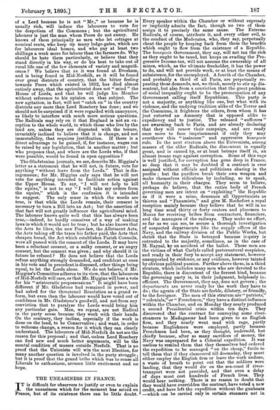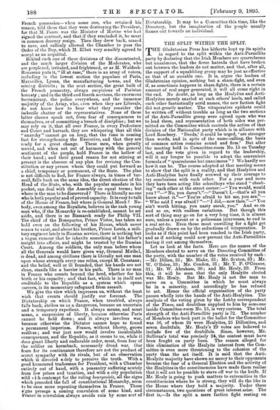1116 UNEASINESS IN FRANCE.
IT is difficult for observers to justify or even to explain the uneasiness which for the moment has seized on France, but of its existence there can be little doubt. Every speaker within the Chamber or without expressly or implicitly admits the fact, though no two of them assign it to precisely the same cause. The Extreme Radicals, of course, attribute it, and every other evil, to the conduct of the Moderates, who, they say, perpetually cheat the people by keeping back from them the benefits which ought to flow from the existence of a Republic. The bourgeois Government, they say, will not tax the rich as they ought to be taxed, but keeps on evading the Pro- gressive Income-tax, will not assume the ownership of all mines, which, as the ultimate freeholder, it has the power to do, and will not provide work, or at least the means of subsistence, for the unemployed. A fourth of the Chamber, and probably a third of all Paris, are perpetually re- peating these demands, not, wo think, merely to stir up dis- content, but also from a conviction that the great problem of social inequality ought to be the preoccupation of any Government calling itself Republican. This party is not a majority, or anything like one, but what with its violence, and the undying tradition alike of the Terror and the Commune, it frightens the others, from whom it has just extorted an Amnesty that is opposed alike to expediency and to justice. The released " sufferers " are swarming back to Paris, and are already declaring that they will renew their campaign, and are ready once more to face imprisonment if only they may overthrow this "insincere" and oppressive bourgeois rule. In the next stratum above the Extremists, among masses of the older Radicals, the discontent is equally great, and is caused by, or at least betrays itself in, an almost insane rage against corruption. Some of this rage is well justified, for corruption has gone deep in France, so deep that it may be doubted if a contract is ever assigned without officials and politicians sharing in the profits ; but the purifiers break their own weapon and make themselves ridiculous by including, so to speak, all humanity in their charges. They seem to believe, perhaps do believe, that the entire body of French governing men are intent on " exploiting " the Republic as if it were a mine, denounce all Opportunists as thieves and " Panamists," and give M. Rochefort a royal reception mainly because they believe that he will in no long time send thirty or forty orators and placemen to Mazas for receiving bribes from contractors, financiers, and the managers of the railways. They make no effort, so far as we can see, to secure a thorough investigation of suspected departments like the supply offices of the Navy, and the railway division of the Public Works, but shriek that the State is betrayed because inquiry is entrusted to the majority, sometimes, as in the case of M. Raynal, by an accident of the ballot. These men are the victims of what Carlyle called preternatural suspicion, and ready in their fury to accept any statement, however unsupported by evidence, or any evidence, however tainted by obvious political passion. Further above these, in a third stratum, which includes many men who are devoted to the Republic, there is discontent of the fiercest kind, because the governing party is, in their judgment, helplessly in- efficient. The Government, they say, does not govern ; the departments are never ready for the work they have to do ; the agents of the State are feeble, dilatory, or friendly, to the foreigner. The men of this stratum are" patriots," "colonials," or " Frenchmen," they have a distinct influence within the Chamber, and on Monday they nearly produced a second Presidential crisis within ten days. They discovered that the contract for conveying some river- steamers to Madagascar had been given to an English firm, and they nearly went mad with rage, partly because Englishmen were employed, partly because Frenchmen had been, as they thought, undersold, but chiefly because, after so many sacrifices of money, the Navy was unprepared for a Colonial expedition. It was useless to remind them that they themselves had ordered the expedition to be managed "on the cheap," futile to tell them that if they clamoured till doomsday, they must either employ the English firm or leave the work undone, a waste of breath to point out that the soldiers were i landing, that they would die on the sea-coast f river- transport were not 'provided, and that even a delay of days must cost hundreds of French lives. They would hear nothing. There is no reason to doubt that they would have overridden the contract, have voted a new credit, and have left the expedition without the gunboats —which can be carried only in certain steamers not in French possession—when some one, who retaincd his reason, told them that they were destroying the President, for that M. Faure was the Minister of Marine who had signed the contract, and that if they rescinded it, he must in common decency resign. Then they drew back, ceased to rave, and sullenly allowed the Chamber to pass the Order of the Day, which M. Ribot very sensibly agreed to accept as an acquittal.
Behind each one of these divisions of the discontented, and the much larger division of the Moderates, who are perplexed, irritated, and frightened, or as M. Waldeck- Rousseau puts it," ill at ease," there is an army of voters, including in the lowest section the populace of Paris, Marseilles, Lyons, the manufacturing towns, and the mining districts ; in the next section, the great bulk of the French peasantry, always suepicious of Parisian honesty ; and in the third and fourth sections, the enormous bureaucracy, the police everywhere, and the immense majority of the Army, who, even when they are Liberals, do not know how to bear what they consider the imbecile chatter of the representatives. None of these latter classes speak out, from fear of consequences to themselves, or of committing a breach of discipline ; but we may rely on it, that all over France, in every Prefecture and Court and barrack, they are whispering that all this " anarchy " cannot go on long, that the time is coming fast for strengthening the Executive, and that they are ready for a great change. These men, when greatly moved, and when not out of harmony with the general sentiment of the people, hold France in the hollow of their hand ; and their grand reason for not stirring at present is the absence of any plan for revising the Con- stitution or any person whom they could put forward as a chief, temporary or permanent, of the State. The plan is not difficult to find, for France always, in times of tur- moil, falls back on the same idea, the direct election of the Head of the State, who, with the popular mandate in his pocket, can deal with the Assembly on equal terms ; but where is the man to be discovered? There is literally no one who is both popular and of proved capacity. It is easy to talk of the House of France, but where is General Monk ? No- body, even among the Royalists, believes in the rash young man who, if the Monarchy is re-established, cannot be set aside, and there is no Bismarck ready for Philip VIL The chief of the Bonapartes, Prince Victor, has taken no hold even on the following of his House, which never teases to exist, and about his brother, Prince Louis, a mili- tary engineer lately in Russian service, there is nothing but a vague rumour that he inherits something of his father's insight into affairs, and might be trusted by the Russian Court. Among the soldiers, the only man before whom all the Generals would have given way, General Miribel, is dead, and among civilians there is literally not one man upon whose strength every one relies, except M. Constans; and the belief, well or ill founded, that his hands are not clean, stands like a barrier in his path. There is no man in France who counts beyond the herd, whether for his birth or his capacity ; and that fact, which is in itself not creditable to the Republic as a system which opens careers, is its momentary safeguard from assault.
We give the view which impresses us, without the least wish that events should justify our forecast. The Dictatorship on which France, when troubled, always falls back, strikes us as a dangerous, because an uncertain and a temporary expedient. It always means, and must mean, a suspension of liberty, because otherwise Paris cannot be held down ; and it always involves war, because otherwise the Dictator cannot hope to found a permanent imperium. France, without liberty, grows restless; and war just now would involve incalculable consequences, and the Republic, as it seems to us, while it does grant liberty and endurable order, must, from fear of the soldier on horseback, necessarily dread war. Our fears for its continuance therefore are not the product of secret sympathy with its rivals, but of an observation which is directed s)lely to perceive the truth. With a good humoured tradesman for President, with a Chamber entirely out of hand, with a peasantry suffering acutely from low prices and taxation, and with a city population wild x% ith contempt for the ruling bourgeoisie, all the signs which preceded the fall of constitutional Monarchy, seem to be once more repeating themselves in France. Those s'gns presage a coming convulsion of some kind, and France in convulsion always avoids ruin by some sort of Dictatorship. It may be a Committee this time, like the Directory, but the imagination of the people usually flames out towards an individual







































 Previous page
Previous page